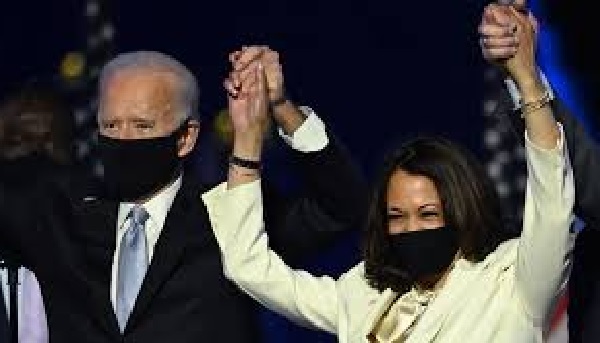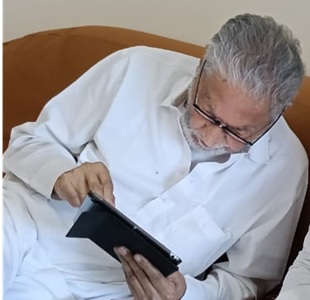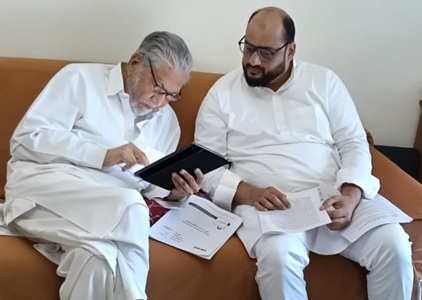By Frank F Islam
Under Joe Biden, US-India relations in areas like trade and commerce, as well as defence and strategic ties, are likely to be strengthened. New Delhi will be a large part of the Biden administration’s Asia Pacific strategy.
Now that the all-consuming debate on who will be better for New Delhi — Donald Trump or Joe Biden — is settled, India-watchers here have moved on to the next set of questions.
They are: what will the Biden White House look like? Who will lead the two key departments, state and defence, which matter the most to India? And, how many Indian-Americans will be in the next administration?
To those who are not familiar with the nitty-gritty of Washington, when an administration changes, the churn rate in personnel is quite high. As many as 4,000 vacancies arise whenever a new president is sworn in, with the White House complex alone accounting for 10 percent of those jobs. Key positions to be filled in include cabinet secretaries, assistant secretaries, dozens of ambassadorships, and district attorneys.
DIVERSE CABINET
To answer the above questions one by one, it is safe to assume at the outset that the new administration will look like the America of today, diverse and representative of the larger Democratic umbrella coalition.
That coalition, which propelled Joe Biden to the presidency, includes a number of ethnic and ideological groups, such as African-Americans, Hispanics, Asian and Indian Americans, labour union members, working-class people, progressives, and moderates. Women voters played a significant role in Biden’s victory — 57 percent of women voted for him, compared to 42 percent for Trump.
Each of the above-mentioned groups is certain to find representation in the administration. As a matter of fact, Kamala Harris ticks off at least three out of four of these boxes: woman, African-American, and Indian-American.
Two names that are speculated about for the state and defence secretaries’ position are women. Former US Ambassador to the UN and National Security Advisor, Susan Rice, is reportedly among the frontrunners for secretary of state, while former Clinton and Obama official Michele Flournoy is said to be considered for secretary of defence.
Whoever is picked for these positions, India will be a big part of the next administration’s foreign policy. That will not be because of the cabinet secretaries, but because of their boss, president-elect Joe Biden.
When Biden is sworn in as president on January 20, 2021, he will enter the Oval Office with one unique distinction: He will have more India expertise than any of his 45 predecessors had at the beginning of their White House tenure. The president-elect has engaged with India for decades, first as the chairman of the powerful Senate Foreign Relations Committee and then as vice president.
During his nearly half a century of public life, Biden has seen the highs and lows of India-US relations through his own eyes. When he first ran for the Senate in 1972, the bilateral ties were at their nadir, with President Richard Nixon siding with Pakistan in the Indo-Pak war the previous year.
As the relations began improving and reaching new heights over the past quarter-century, Biden had a seat at the high table, as an active participant, in many of the seminal moments. So, more than anyone else, the President himself will be invested in America’s relations with India.
Therefore, irrespective of whoever is in charge at Foggy Bottom and the Pentagon, the bilateral ties, in all areas, trade and commerce, as well as defence and strategic relations, will be strengthened. New Delhi will be a large part of the next administration’s Asia Pacific strategy.
Where India will gain the most will be on the trade and commerce front, where the Trump administration took a number of steps backward with its protectionist trade policies.
Will there be any disagreements between the United States and India on areas such as human rights? Absolutely. But, unlike the interactions on differences of opinion with the Trump administration, I am confident that the two sides will handle all disagreements in a mature, professional, and diplomatic manner.
INDIAN-AMERICAN REPRESENTATION
Based upon the track record of previous Democratic administrations, one can expect a significant presence of Indian-Americans in the Biden White House. Obama currently holds the record for nominating and appointing the largest number of Indian-Americans. Now, judging by their presence in various transition committees, it appears that an even larger group of Indian Americans will be working in the executive branch after January 20.
The president-elect has tapped nearly two-dozen Indian Americans to serve on his 500-member transition agency review teams. Three of the teams are led by Indian Americans. Stanford professor Arun Majumdar leads the Department of Energy review team; March of Dimes Chief Medical and Health Officer Rahul Gupta heads the Office of National Drug Policy team; the Office of Personnel Management team is led by Philanthropy Northwest CEO Kiran Ahuja.
Similarly, the president-elect’s 13-member Covid-19 task force has three Indian Americans. Its co-chair Vivek Murthy, a former surgeon general, is touted as a potential candidate for the top Health and Human Service job. In the new administration, no cabinet member will have a more important role than the HHS secretary, who will be in charge of fighting Covid-19, which was described by Biden as his Number One priority.
What the presence of a record number of Indian Americans on various transition teams and the Covid-19 task force indicates is the incredible expertise and deep pools of talent within the community in a number of fields, such as healthcare, technology, law, economics and finance. Given this, there is no doubt that Indian Americans will be well represented in the Biden administration.
The community, like most minority groups, has been reliably Democratic for decades. A number of Indian Americans worked hard for the victory of the Biden-Harris ticket. Their representation will be a just reward for the community for its loyalty and hard work. More importantly because of their competence and commitment to the country, beneficial to the entire United States as well.







0 Comments